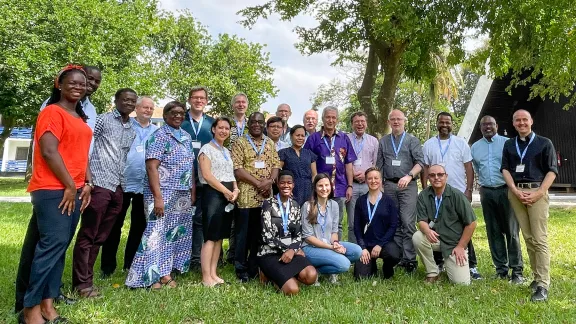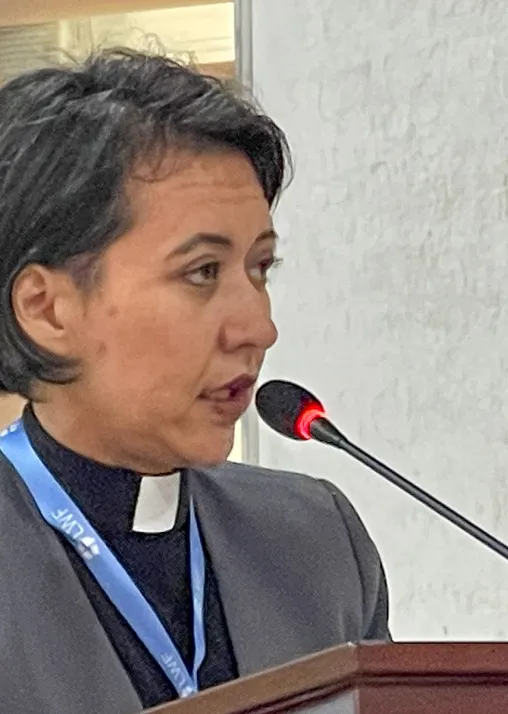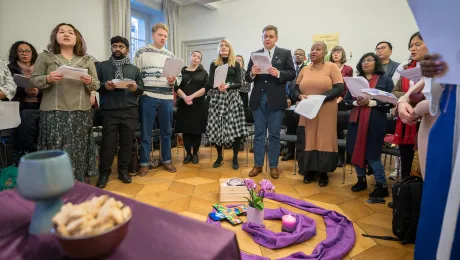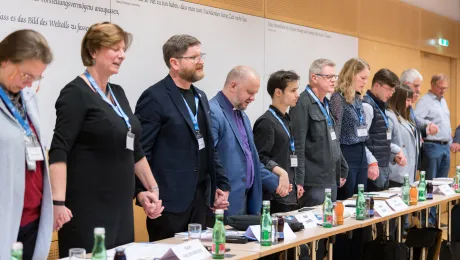What lessons have been learnt from the COVID-19 pandemic about online versus in-person education and how can these insights transform theological education? An ecumenical consultation in Ghana grappled with these questions.

Participants at an ecumenical consultation on ‘Pedagogy and Pandemic. Photo: Kakay Pamaran
A hybrid ecumenical consultation in Ghana explored the challenges and opportunities for theological education
(LWI) - What can the trauma of the COVID-19 pandemic teach us about our Christian faith which is grounded in “the trauma of the Cross?” How has theological education been transformed by the unprecedented experiences of isolation and lockdown? How can seminaries and other places of learning harness new opportunities offered by online and hybrid technologies?
These were the key questions discussed during a three-day ecumenical consultation, based at Trinity Theological Seminary in Accra, Ghana, entitled ‘Pedagogy and Pandemic’. Over 80 theologians and academics took part in the hybrid event in December, organized by the Lutheran World Federation (LWF) in partnership with the World Communion of Reformed Churches, the World Council of Churches and Evangelische Mission Weltweit.
Participants from six of the seven LWF regions agreed that the pandemic highlighted both the advantages, but also the limitations and inequalities of in-person theological formation. As such, they said, COVID-19 served as a kind of wake-up call and “catalyst in the pre-existing crisis of residential seminary education.”
During a keynote introduction, Rev. Dr Kayko Driedger Hesslein, associate academic dean and director of contextual education at Theological Seminary in Canada, focused on the ways in which online learning can teach students about the values of incarnation, inclusion, community and service of neighbor. The sudden obligatory shift to online teaching, she noted, disrupted the “embodiedness of our relationality and scattered our communities into a digital diaspora, straining our relationships in Christ.”

Rev. Dr Kayko Driedger Hesslein, associate academic dean and director of contextual education at Theological Seminary in Canada. Photo: Kakay Pamaran
In pre-pandemic times, she said, theological education was principally seen as “an activity of the mind,” largely overlooking “the bodies that carry those minds around.” Yet one of the laments heard most frequently during the COVID years was how much students and teachers missed being in each other’s physical presence. This realization has important theological insights, she said, because “our physicality is part of God’s intention for our existence” and this “embodiedness is foundational for God’s relationship with us.
Is it possible, Driedger Hesslein asked, that recent increases in alienation and polarization are the result of online “disembodied interactions,” which in turn “enables us to exploit, degrade and even kill other bodies?” At the same time, she continued, online education provides vital access “to those whose bodies cannot get to a physical classroom,” because of disability, travel costs, caregiving responsibilities or other limiting factors. Educators must be more sensitive to the physical needs of their students, as well as to the presence of family members or others “on the periphery” with whom the students interact, she said.
Spiritual resources to process trauma
Dr David Wang, a pastor and associate professor of psychology at Fuller Theological Seminary in California, USA, shared research carried out across different religious denominations in the United States during the pandemic. The results, which reflect the pattern in wider society, show a huge increase in depression, anxiety and post-traumatic stress disorder.
People of faith, he noted, also face “spiritual struggles, including anger with God” and a rise in complex theological questions. Yet members of faith communities have resources to help them mitigate anxiety and deal with depression, he added, including an understanding of the values of humility, forgiveness and acceptance, as well as a sense of belonging and a safe space where trauma can be processed. At the same time, participants pointed out that seminaries and churches themselves have sometimes been places where students and congregants have experienced trauma.
Dr Karla Koll, director of the School of Theological Sciences at the Latin American Biblical University, based in San Jose, Costa Rica, noted the way in which the pandemic “added to the traumas of racism and injustice” faced by so many people in the region. During lockdown, staff at the university, which includes programs for pastors and lay leaders in 17 countries, set up online support groups and other forms of pastoral care to better respond to the mental health needs of the students.
The pandemic has taught us to “recognize our vulnerability and limitations, overcoming the model of super-pastors."
– Dr Karla Koll, director of the School of Theological Sciences at the Latin American Biblical University.
Koll shared some important learnings from the period of pandemic, including a need to “recognize our vulnerability and limitations, overcoming the model of super-pastors" to which church leaders had traditionally aspired. “COVID has taught us to name our shared experiences of helplessness and realize that our role is to accompany people who struggle with questions, rather than having all the answers,” she said.
Rev. Dr Chad Rimmer, LWF Program Executive and co-facilitator of the consultation, commented: “The LWF emphasizes the link between theological education and formation because learning involves our whole being – body, mind and soul. While the COVID-19 pandemic revealed this reality in many painful ways, it also revealed the promise of new opportunities to decolonize the content and methods of learning.”
In a concluding communique, participants stressed the importance of transformational teaching and learning in the post-pandemic world. “We are not merely challenged to translate established models of learnings, spiritual and ministerial formation into new formats,” they said, but “to rethink what theological education is about, for whom it is, to which ends and what it requires.”


